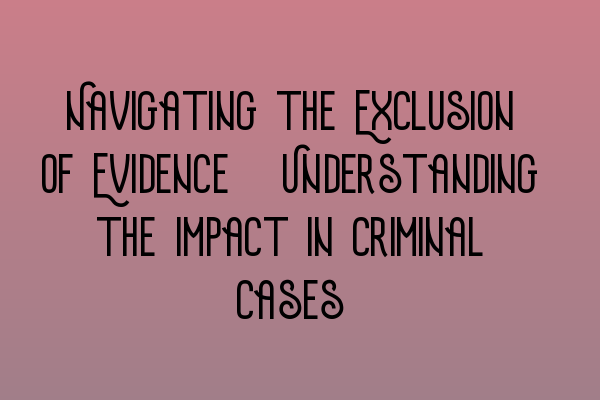Navigating the Exclusion of Evidence: Understanding the Impact in Criminal Cases
Welcome to the SQE Criminal Law & Practice Law UK blog! In this post, we will dive deep into the topic of excluding evidence in criminal cases. Understanding the impact of evidence exclusion is crucial for criminal lawyers and practitioners. So, let’s begin!
What is the Exclusion of Evidence?
In criminal cases, evidence plays a vital role in establishing guilt or innocence. However, certain circumstances may lead to the exclusion of evidence. When evidence is excluded, it means that it cannot be used in court to support a party’s case. This exclusion can have significant implications for the outcome of a criminal trial.
The exclusion of evidence can occur for various reasons, including:
- Violation of an individual’s rights
- Failure to follow proper procedures
- Tainted evidence
- Non-compliance with legal requirements
Implications of Evidence Exclusion
When evidence is excluded from a criminal trial, it can have far-reaching consequences. In many cases, the exclusion of crucial evidence weakens the prosecution’s case and may even lead to the acquittal of the accused. On the other hand, if the defense’s evidence is excluded, it can hinder their ability to present a strong and compelling defense.
Navigating the Exclusion Process
Navigating the exclusion of evidence requires a thorough understanding of the legal principles surrounding evidence exclusion. Criminal lawyers must have a strong knowledge of the relevant laws and precedents to effectively argue for the exclusion or admission of evidence.
One crucial aspect of navigating the exclusion process is conducting a comprehensive review of the evidence. This involves examining how the evidence was obtained, whether any constitutional rights were violated, and if proper procedures were followed. Identifying potential grounds for excluding evidence is a critical step in building a solid defense strategy.
To succeed in excluding evidence, lawyers must present compelling arguments and establish a strong legal basis for exclusion. This is where the expertise of experienced criminal lawyers comes into play. Their deep knowledge of the law and persuasive advocacy skills can make a significant difference in achieving a favorable outcome for their clients.
Conclusion
The exclusion of evidence is a complex issue that can significantly impact the outcome of criminal cases. Understanding the implications and navigating the exclusion process requires a strong understanding of the law and effective advocacy skills. Hiring an experienced criminal lawyer who specializes in evidence exclusion is crucial for anyone facing criminal charges.
If you found this article helpful, you may want to check out these related articles:
- SQE 1 Practice Exam Questions
- SQE 1 Practice Mocks FLK1 FLK2
- SQE 2 Preparation Courses
- SQE 1 Preparation Courses
- SRA SQE Exam Dates
